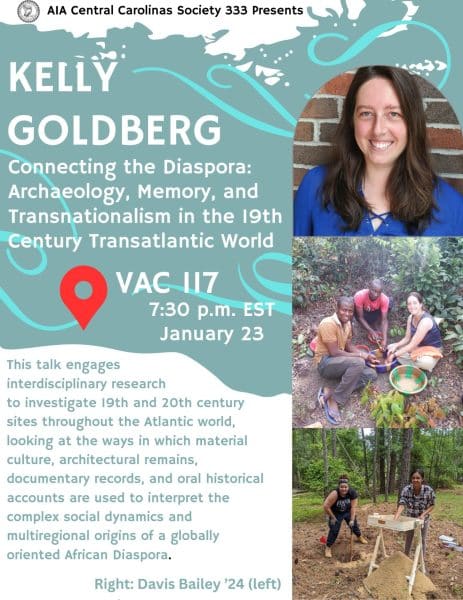NEWS
Davidson College Presents Kelly Goldberg, “Connecting the Diaspora: Archaeology, Memory, and Transnationalism in the Nineteenth Century Transatlantic World”
 January 23, 2023
January 23, 2023
7:30 p.m.
Belk Visual Arts Center 117
About the lecture:
The nineteenth century transatlantic slave trade had significant social, political, and economic ramifications for coastal West African environments, and caused reverberations throughout the Atlantic world. As Britain pressured European and American imperial powers to join in anti-slave trading endeavors in the early portion of the nineteenth century, the slave trade was directed to more secluded areas such as the Rio Pongo in coastal Guinea, where imperial and national powers were scarce, and both legal and contraband trade could continue to succeed.
In these situations, a newly established class of transnational trading families, with ties to global connections on both sides of the Atlantic, directed the evolution of local social and political landscapes. This talk engages interdisciplinary research to investigate nineteenth and twentieth century sites throughout the Atlantic world, looking at the ways in which material culture, architectural remains, documentary records, and oral historical accounts are used to interpret the complex social dynamics and multiregional origins of a globally oriented African Diaspora.
About the speaker:
Dr. Goldberg, an Instructor for the Honors College at the University of South Carolina, is a historical archaeologist with research specialties in the African Diaspora in both West Africa and the eastern US, public archaeology and stakeholder relations, and museum studies and management. She has worked on James Island and in Guinea, where she excavated slave trading ports in rural villages of coastal Guinea tried in order to understand how the newly emerging transnational network of nineteenth century trading families manipulated perceptions of identity to maintain power and status during evolution of the abolition of the slave trade, and such manipulations of identity affect contemporary notions of memorialization and heritage.
To learn more about the Archaeological Institute of America, especially Society 333, visit the website.


